Is Duct Tape Waterproof? No, But It's Resistant
Author: Omar Alonso | Editor: Omar Alonso
Review & Research: Jen Worst & Chris Miller
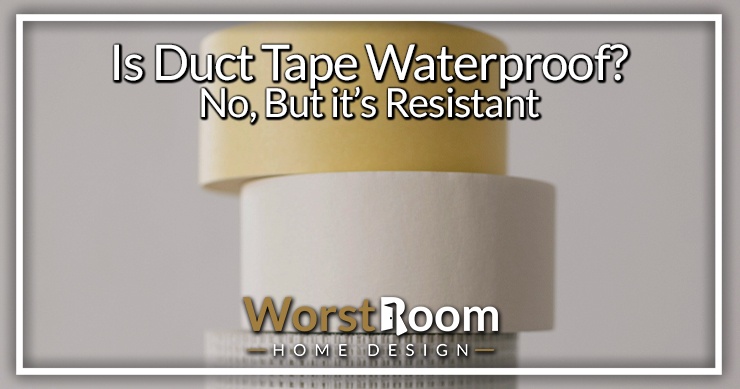
There are a few essential items that are in almost any toolbox around. Screwdrivers, gloves, and duct tape are some of the top three. Duct tape is versatile and can tackle many jobs. But is duct tape waterproof? Duct tape does provide some protection against moisture, but it is not waterproof.
In this article, we’ll briefly review why duct tape isn’t waterproof and what its uses are. We’ll also cover what to look for when selecting duct tape and techniques for how to get the most water protection possible using duct tape.
Is Duct Tape Waterproof? Quick Answer
Duct tape is not waterproof. It is water-resistant. The specific amount of water that duct tape can hold depends on many factors, including the specific duct tape and the attempted usage. Many people ask "does duct tape work underwater?" and the answer is an even bigger "no."
Even though it’s not waterproof, duct tape can be useful as a temporary measure. It can stop water from penetrating for a short time. For example, some duct tape repairs might last much longer than you’d think, successfully keeping water where you want it.
Choosing the right duct tape and knowing how to get the most out of it can go a long way.
Selecting Duct Tape
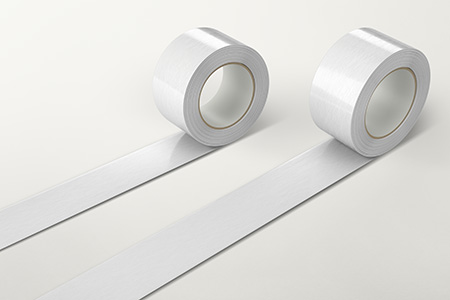
To get the most out of any duct tape, it starts when you bring it to the register or add it to your online shopping cart. Choosing duct tape has a large impact on how well it will perform as a water-resistant barrier and its overall performance.
Duct Tape Construction
Duct tape has three layers. An adhesive layer is on the bottom, ready to stick to nearly anything around. This sticky layer is what helps give a solid seal and is one of the things that make duct tape so incredibly useful.
The next layer of duct tape is a thin cloth or grid of threads. The exact design depends on the manufacturer, but this layer provides added strength, making duct tape a surprisingly strong connection.
The top layer is usually a polyethylene film. It helps create a strong backbone for the tape and provides much of the water-repelling characteristics of duct tape. It is the first layer of defense. When it starts to break down, the other layers get soaked and degrade.
Selecting the Right Duct Tape

Choosing the right duct tape is a matter of knowing what job it will tackle. Sometimes if you need to cover a large area and it's a temporary solution, cheaper duct tape with a thinner construction might be acceptable.
But when it matters most or for the roll you always want to have handy for nearly any job, selecting a higher quality duct tape can be worthwhile. Some use better-performing adhesives and outer layers.
Proper Storage
One thing that can be an issue for duct tape durability and water-resistant factors is storage. You want to avoid keeping duct tape in areas exposed to the elements or extreme temperature changes.
Storing duct tape in sunlight can also cause a lot of harm. There’s nothing worse than needing a trusted roll of duct tape to find out that it’s a solid, wrinkly mess. The outer layer can crack easily when sun damaged too.
Do yourself a favor and keep duct tape at a relatively comfortable temperature and away from sunlight. If you need to keep a roll in more challenging conditions, check on it regularly to see if it needs to be replaced.
Getting the Most Water Protection With Duct Tape
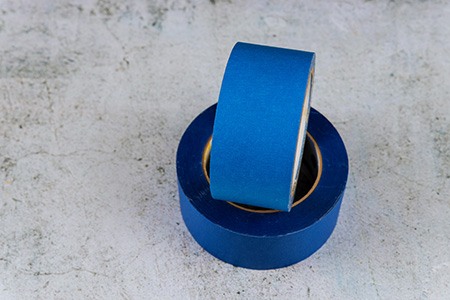
While we know the answer to “Is duct tape waterproof?” is no, let’s see how far we can push it anyway. Duct tape can serve as a decent water barrier, especially if you take certain precautions.
Before you slap duct tape on anything, take a moment to prepare the surface and consider your surroundings. It can impact the overall result and longevity of a duct tape repair, especially when water is involved.
Clean, Smooth Surface
For duct tape to get a solid connection with a surface, it is best if the surface is clean and smooth. If it is covered in grime, oil, or other debris, the duct tape will stick to that instead of the intended surface.
Over time, this can cause the duct tape to not be in full contact. This will allow water to rush in and can hurt the duct tape’s ability to provide a water barrier. And once a drop gets in, you can be certain more is to follow. Water is powerful. Use any type of sander to smooth the surface and then make sure to wipe the dust away and allow that to dry before applying the tape.
Porous surfaces provide another challenge too. The water can come through the surface from other directions and directly wet the adhesive side of the duct tape. Duct tape repairs are unlikely to last very long on porous surfaces.
Temperature & Moisture
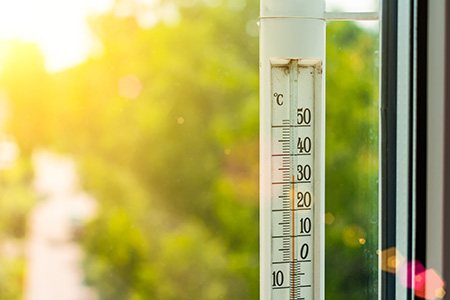
Two other things to avoid are attaching duct tape in extreme temperatures or an overly wet environment. Both have negative consequences for duct tape’s ability to prevent water from flowing.
Sometimes you’ll need to use duct tape in extreme heat or cold. If your car breaks down due to a ruptured hose, that is not the time to avoid using duct tape because it’s too hot. Go for it and hope it lasts long enough to get to a place where you or someone else can repair it.
But if you can avoid it, it’s best to use duct tape in a room-temperature environment. Extreme heat and cold can both impact the adhesive properties. It’s best to do it in a relatively controlled space. It's helpful to know how long it takes for water to freeze when using it in low temperature environments, too.
Now this one might be difficult since we’re talking about the water-resistant abilities of duct tape. But for the duct tape to stick well to the surface, the area needs to be dry. Even excessive humidity, such as a marine layer or thick fog, can cause issues with proper adhesion.
Once again, sometimes it just doesn’t matter. If you're in a desperate situation, you have to use duct tape even if the area is wet. When that's the case, plan for the wet tape not to stick well. You’ll likely have to try to get the water to stop, then continue the repair over that first layer.
It might not hold up forever, but it can get you down the road or get you through the immediate task.
Avoid Sunlight & Bending
Two other things can help get the most out of duct tape’s water resistance. The sun is an amazing thing. We wouldn’t survive without it. But its rays are harmful, even to duct tape.
So if you want your repair to be long-lasting, keep it out of direct sunlight. This approach can be especially challenging for certain repairs, like on a sunshade cover or other outdoor gear.
But sometimes you can change the location easily. If that’s the case, get it out of direct sunlight.
When finding out the answer to “Is duct tape waterproof?” is no, you might think it’s useless against water. That’s not true. But one thing that will make it useless against water is bending it too much.
If you use duct tape to repair water, try to keep the repaired area still. If you bend or twist it, the adhesion might loosen in some areas. It could also cause wrinkles to form. These will allow water to creep in, eventually failing.
Waterproof Duct Tape Alternatives
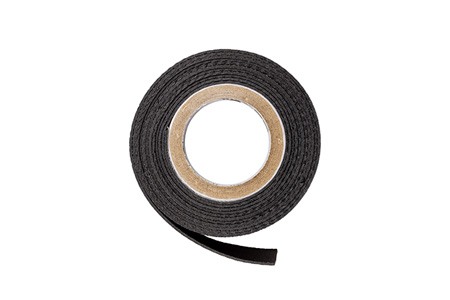
Is duct tape water-resistant? Yes, and even though duct tape isn’t waterproof, some types of tape are. They’ll still need to be used carefully to get the most water protection, but they can outperform duct tape in a waterproofing contest.
Waterproofing tapes are often made from a more durable product. Some incorporate a thin metal such as aluminum, while others go for butyl rubber for the waterproof layer. You can even find ones that are designed for use underwater.
If you have the time and resources to get a new roll of tape, waterproofing tape is a better bet for wet repairs than duct tape.
Is Duct Tape Waterproof? Not Completely
Unfortunately duct tape is not waterproof. But it is water resistant, and if you know how to use it, duct tape can provide some water-sealing capability. The history of duct tape is a long one and there's been plenty of time to optimize its manufacturing to make it the most water resistant as possible.
It starts with high-quality duct tape. Some jobs don’t need it, but when you’re trying to waterproof something, reach for the upper shelf. A smooth, clean surface in a room-temperature environment will help the duct tape stick to the surface the best.
This task might be hard in a wet location, so perhaps getting stronger waterproof tape is a better idea. There are specific waterproofing tapes that can do a much better job of keeping water out entirely. So, is duct tape waterproof? No, but it can work for a little while as you seek a better option.



